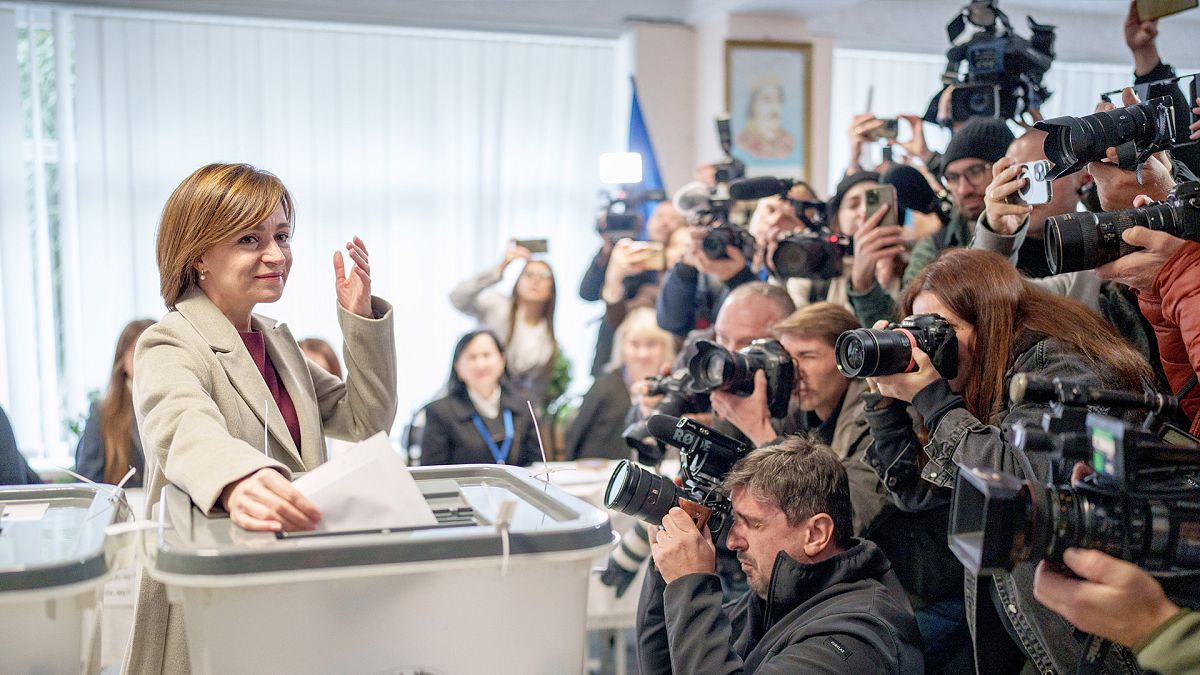Moldova votes yes to join the EU as president claims Moscow meddled

The first batch of preliminary results indicated the referendum on Moldova’s EU future was a “no,” but a last-minute spike in votes in favour from the eastern European country’s diaspora won the referendum by the slimmest of margins.
A referendum on Moldova’s EU membership bid passed by an extremely slim margin, with the difference between “yes” and “no” votes counted in hundreds.
Although early preliminary counts showed Moldovans largely rejected the proposal to enshrine the eastern European country’s EU path in its constitution, a boost of votes from Moldovans abroad gave the “yes” camp a much-expected boost.
According to the latest preliminary result, with 99.5% of votes counted, the two camps remain firmly divided, with 50.3% of voters in favour and 49.7% against, but the count shows the referendum has passed.
Earlier on Monday, the difference between them was a mere 744 votes “yes”.
Turnout for Sunday’s vote surpassed 50%, much above the 33% needed for the referendum to be valid.
Moldova’s President Maia Sandu, who looked set to win the first round of a presidential race Monday, accused “criminal groups” of undermining a referendum asking voters to decide whether to secure a path toward EU membership, which risked being narrowly rejected.
In early October, Moldovan law enforcement said it had uncovered a massive vote-buying scheme orchestrated by Ilan Shor, an exiled pro-Russia oligarch who currently resides in Russia, which paid €15 million to 130,000 individuals to undermine the two ballots.
Shor was convicted in absentia last year and sentenced to 15 years in prison for fraud and money laundering in the case of nearly €1 billion that went missing from Moldovan banks in 2014. He denied the allegations, saying “the payments are legal,” and cited a right to freedom of expression. Shor’s populist Russia-friendly Shor Party was declared unconstitutional last year and banned.
On Thursday, Moldovan authorities foiled another plot in which more than 100 young Moldovans received training in Moscow from private military groups on how to create civil unrest around the two votes. Some also attended “more advanced training in guerrilla camps” in Serbia and Bosnia, police said, and four people were detained for 30 days.
A pro-Western government has been in power in Moldova since 2021, a year after Sandu won the presidency. A parliamentary election will be held next year.
Moldova, a former Soviet republic with a population of about 2.5 million, applied to join the EU in the wake of Russia’s all-out invasion of neighbouring Ukraine in early 2022 and was granted candidate status that summer alongside Ukraine. Brussels agreed in June to start membership negotiations.
Related
A New Book Argues That What Happens in Europe Doesn’t…
Remaking the World: European Distinctiveness and the Transformation of Politics, Culture, and the Economy by Jerrold Seigel “No issue in world
Poland plans military training for every adult male amid growing…
Poland’s prime minister, Donald Tusk, has said his government is working on a plan to prepare large-scale military training for every adult male in response t
2025 European Athletics Indoor Championships: Ditaji Kambundji secures women’s 60m…
Switzerland’s Ditaji Kambundji walked away from the 2025 European Athletics Indoor Championships in Apeldoorn on 7 March with much more than her first Europea
Takeaways from the EU’s landmark security summit after Trump said…
BRUSSELS (AP) — European Union leaders are trumpeting their endorsement of a plan to free up hundreds of billions of








